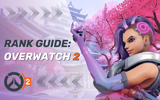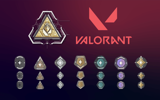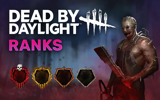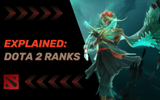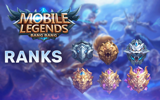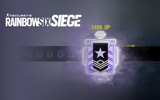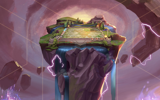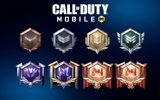The Rocket League Ranking System
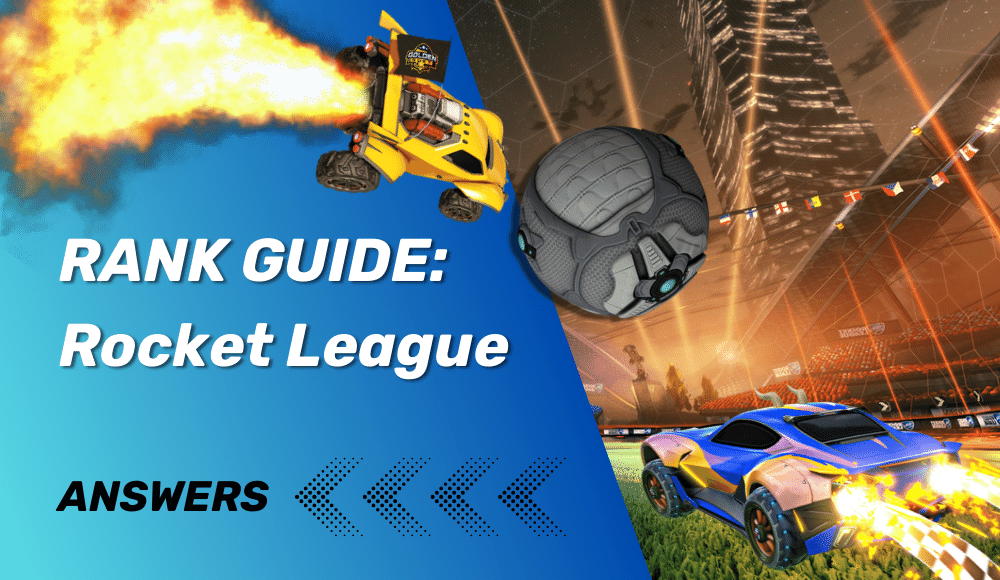
Welcome, Rocket League enthusiasts! In this guide, we're going to uncover the Rocket League ranking system. From understanding the different ranks, exploring matchmaking algorithms and teaching you how to improve competitively, we'll cover everything you need to know to climb the leaderboard in this high octane game.
The Different Rank Tiers
Let's start off with the basics. In Rocket League, there are several rank tiers you could find yourself in, each representing a certain level of skills and experience.
Bronze and Silver
These are typically where beginners to the game fall, who are still exploring the mechanics and controls.
Gold and Platinum
Here's where we find most players. They've got a handle on the basics, but are yet to master the more complex mechanics and strategies.
Diamond and Champion
This is the territory of the experienced and skilled players who have invested a lot of time into the game. If you've made it here, you're definitely doing something right!
Grand Champion and Supersonic Legend
These are the cream of the crop, the top echelon of players. It's a tough climb to get here, but the bragging rights are definitely worth it!
Each of these tiers, except for Unranked and Supersonic Legend, have four divisions. As you climb the ranks, the game starts expecting more from you - slicker mechanics, sharper game sense, and unyielding consistency.
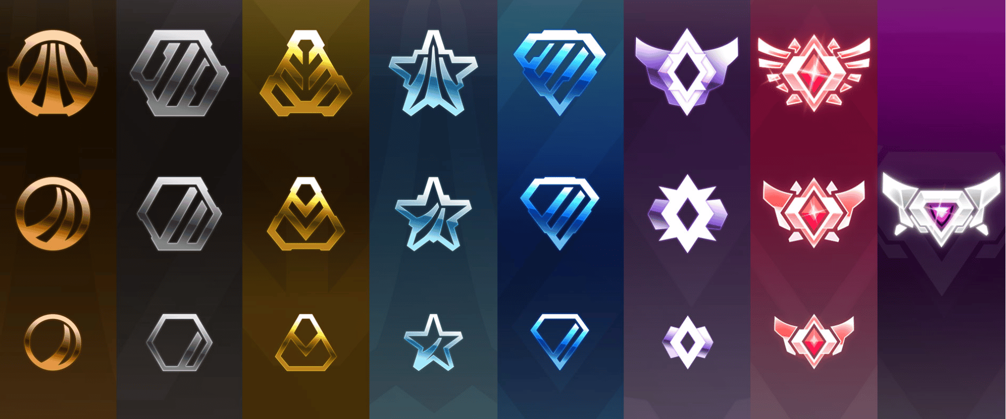
Rank Distribution of Players in Rocket League
Every season, the game developers, Psyonix, provide a detailed breakdown of the player base across different ranks. This distribution is designed to ensure that the majority of players (around the 50th percentile) land in the Gold III - Platinum II range. This means if you're in these ranks, you're in good company!
Below is table showing you the rank distribution among Standard 3v3 Ranked players between Silver and Grand Champion, and the MMR that is required for each division:
|
Rank Tier |
Division 1 |
Division 2 |
Division 3 |
Division 4 |
|---|---|---|---|---|
|
Grand Champion II (1.03%) |
1,576 — 1,598 |
1,600 — 1,637 |
1,639 — 1,660 |
1,662 — 1683 |
|
Grand Champion I (1.91%) |
1,435 — 1,458 |
1,460 — 1,495 |
1,498 — 1,527 |
1,537 — 1,558 |
|
Champion III (3.28%) |
1,316 — 1,333 |
1,335 — 1,367 |
1,368 — 1,396 |
1,402 — 1,434 |
|
Champion II (5.31%) |
1,196 — 1,213 |
1,215 — 1,238 |
1,248 — 1,278 |
1,282 — 1,314 |
|
Champion I (9.32%) |
1,076 — 1,093 |
1,095 — 1,121 |
1,128 — 1,159 |
1,162 — 1,185 |
|
Diamond III (9.47%) |
995 — 1,003 |
1,006 — 1,027 |
1,029 — 1,049 |
1,052 — 1,066 |
|
Diamond II (11.18%) |
915 — 923 |
925 — 946 |
948 — 965 |
972 — 989 |
|
Diamond I (12.81%) |
835 — 843 |
845 — 866 |
869 — 889 |
892 — 914 |
|
Platinum III (9.85%) |
775 — 778 |
781 — 797 |
798 — 815 |
817 — 834 |
|
Platinum II(9.08%) |
715 — 718 |
720 — 737 |
738 — 755 |
757 — 774 |
|
Platinum I (8.44%) |
655 — 658 |
660 — 677 |
678 — 695 |
697 — 714 |
|
Gold III (6.88%) |
595 — 598 |
600 — 617 |
621 — 635 |
637 — 654 |
|
Gold II (4.93%) |
535 — 538 |
540 — 557 |
558 — 575 |
577 — 594 |
|
Gold I (3.24%) |
475 — 478 |
480 — 497 |
502 — 515 |
517 — 534 |
|
Silver III (1.77%) |
416 — 418 |
425 — 437 |
448 — 455 |
457 — 474 |
|
Silver II (0.87%) |
355 — 358 |
360 — 377 |
387 — 396 |
402 — 414 |
|
Silver I (0.36%) |
296 — 297 |
302 — 317 |
321 — 335 |
337 — 354 |
MMR in Rocket League
MMR is your actual skill level in the rough and tumble world of Rocket League It. takes into account your performance in previous matches and adjusts your rank accordingly. The higher your MMR, the higher your rank will be. Winning a match increases your MMR, while losing a match decreases it. Easy to understand, right? Well, it gets a bit more complicated.
MMR is also influenced by the level of competition you're up against. If your team's combined MMR is lower than your opponents', you'll gain more MMR from a win and lose less from a defeat. On the flip side, if your team's combined MMR is higher, you'll gain less from a win and lose more from a defeat. So you see, the stakes are always high!
It's also worth noting that different playlists have different MMRs. That means your MMR in Solo Duel will be different from your MMR in Doubles or Standard 3v3. Even the extra modes like Hoops and Rumble got its own separate ranking. This allows you to be more competitive in one playlist while taking it easy in another. So don't be discouraged if you're not climbing the ranks as quickly in one playlist as you are in another.
Seeing your MMR with BakkesMod
While MMR is hidden in the game, you can view it using external tools like BakkesMod. This tool allows you to track your MMR changes after each game, helping you understand how much MMR you need to reach the next division or rank. It also shows the MMR of your teammates and opponents during the match, which can be very useful when forming a strategy!
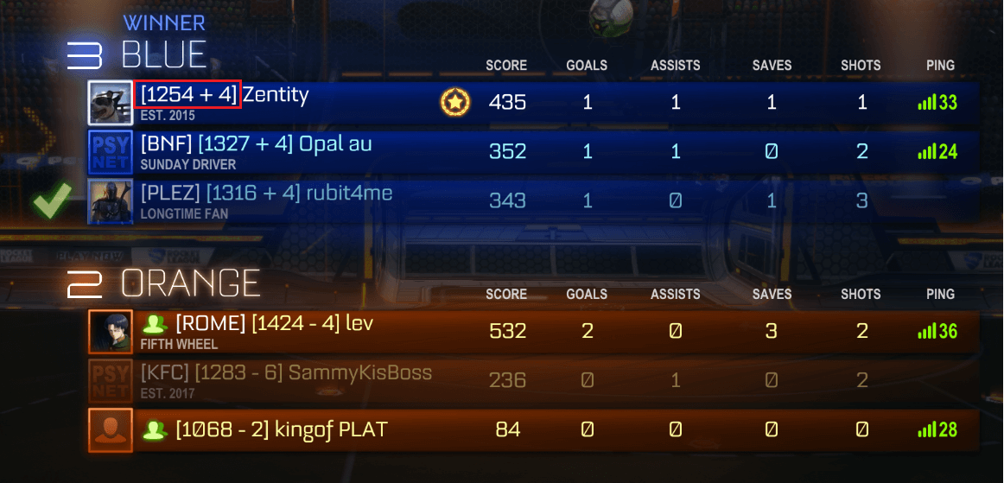
We highly recommend getting BakkesMod if you're serious about ranking up!
Track performance with Rocket League Tracker Network
So you're amped up and ready to boost your Rocket League ranking? Excellent! But, before we hit the field, let's talk about how you can keep track of your performance, so you know exactly where to focus your improvement efforts. Enter the Rocket League Tracker Network, an absolute game-changer in this arena!
The Rocket League Tracker Network is an external tool that helps you monitor your progress in the game. It's loaded with features to give you an in-depth understanding of your gameplay. So, how does it work, you ask? Let's break it down!
How to Use the Rocket League Tracker Network
The Tracker Network is a breeze to use! All you've got to do is enter your in-game name and the platform you're playing on. Once you do that, you'll get a detailed overview of your Rocket League career. It includes your win rate, number of goals, and so much more. So you can easily see where you're shining and where you might need a little practice.
What Information Does it Provide?
The Tracker Network doesn't just give you raw data, oh no! It breaks it down into bite-sized pieces, making it easy to digest. Here's what it serves up:
- Match history: It lists your recent matches, showcasing the wins and the losses. You can even view the MMR change after each game. Talk about detailed!
- Rank and Division progress: Watch your rise through the ranks with the Tracker Network. It shows your progress over time, so you can see exactly when you moved up a division or a tier.
- Stats Overview: This section provides a comprehensive overview of your performance stats. It includes your goals per match, save percentage, win rate, and much more. It's a great way to break down your gameplay into specific areas for improvement.
Tracking your progress is the key to getting better, and the Rocket League Tracker Network is your ticket to doing just that. So get on there, dig into your stats, and let's start tackling those weaknesses head-on!
Tips and Tricks to Rank Up
The backbone of ranking up in Rocket League is in understanding and mastering the game's mechanics. This involves stuff like your car's controls, ball control, shooting, dribbling, defending, and aerial abilities. It might sound like a lot, but trust us, practice certainly makes perfect.
For instance, becoming adept at dribbling can allow you to better control the ball, create scoring opportunities, and even outmaneuver your opponents. Developing strong defensive skills can hinder the enemy's scoring chances while setting up counter-attacks for your team. If you perform better defensively you might want to stay back more to give your teammates a chance to step up and go for goal. Just remember that rotating is important so if you notice a teammate going back for boost or hesitating, it might be your cue to step up! This means capitalizing on your strengths and working on your weaknesses. Play in positions and roles where you excel, and practice those where you struggle.
Don't forget to learn from your mistakes too! Reviewing your game replays can provide a wealth of information about your performance. Identifying and correcting errors in your gameplay can lead to significant improvements, pushing you up the ranks quicker than you'd expect. Some pros have said that reviewing your replays is the single best way to get better at Rocket League if you're already somewhat decent.
Common Mistakes to Avoid
Speaking of mistakes, there are several common ones that Rocket League players often make. These include overcommitting to attacks, neglecting defense, ball chasing, and lack of communication. Avoiding these pitfalls will not only improve your gameplay but also increase your chances of ranking up. Remember, Rocket League is a team game, and teamwork makes the dream work!
The Significance of Teamwork
So, you're a hotshot at scoring goals and can perform aerials with ease? That's great, but Rocket League is also about how you play with your team.
On the higher tiers, players don't just randomly chase the ball around. There's a certain level of sophistication in their plays, a rhythm. They know when to rotate, when to go for the ball, and when to hang back and defend. They're always aware of their teammates' positions and adjust their plays accordingly. This level of synergy is what separates the pros from the average players.
Effective Communication
Well, you might be thinking, "Okay, I get it. Teamwork is essential. But how do we achieve this synergy?" The answer to that is through effective communication.
Communication in Rocket League isn't necessarily about voice chats or typing out messages during the heat of the match (although these can be useful too). It's about using the game's quick chat functions strategically and understanding the unspoken rules of rotation and positioning. When you and your teammates are on the same page, you'll find that your plays will be much smoother and more coordinated.
Communication Tools for Rocket League
Now, we're not saying you should forget about voice chats or other communication tools. Actually, they can be really helpful, especially if you're playing with a regular team.
Tools like Discord allow for real-time communication, which can be invaluable in coordinating intricate plays or quickly adapting to unexpected situations. However, remember that good communication is as much about listening and understanding as it is about speaking. So, keep your communication clear and concise, and always be ready to adapt to your teammates' plans.


